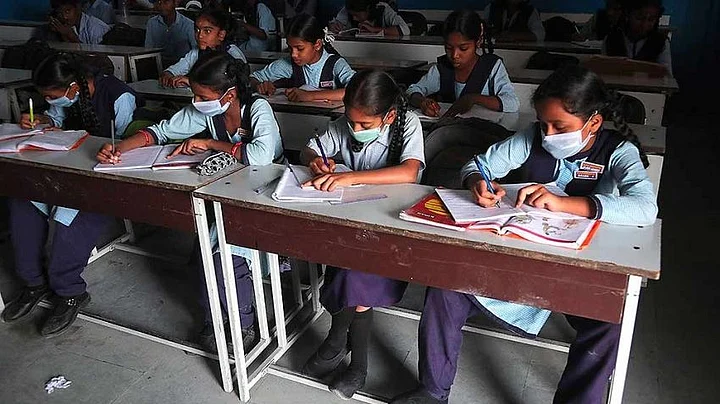As indicated in the ‘Unlock 4’ guidelines, the Centre issued guidelines to partially reopen schools for Classes 9-12 on a trial basis from 21 September, leaving it to state governments to take the final call.
Staggered timings, regular sanitisation, and compulsory masks will be followed as students return to school after a gap of almost seven months. On 18 September, Delhi government announced that all schools will be shut till 5 October, going back on its decision to partially reopen.
So which states have decided on partial reopening? What happens if the student is not comfortable going to school? Here’s a primer.
Which states in India are planning to partially reopen schools from 21 September?
- Haryana
- Punjab
- Chandigarh (UT)
- Jharkhand
- Bihar
- Madhya Pradesh
- Andhra Pradesh
- Assam
- Karnataka
Have other states said that they would not be reopening schools?
The following states have said that their schools will remain shut at least until the end of September 2020.
- Maharashtra
- Delhi
- Tamil Nadu
- Gujarat
- West Bengal
- Uttarakhand
- Kerala
- Goa
Some states are yet to clarify their stand on whether schools are partially opening or not. These states are:
- Telangana
- Uttar Pradesh
- Rajasthan
There is no information about other states in the public domain.
I am a student of Class 10 living in Delhi. Is it mandatory for me to go to school from 21 September?
No. Students of Classes 9 to 12 shall be permitted to attend school on a voluntary basis to take guidance from their teachers. This will be subject to written consent of their parents/guardians.
Such visits and teacher-student interactions must be organised in a staggered manner.
Will schools conduct regular eight-hour classes when they reopen?
Schools, colleges, educational and coaching institutions will remain closed for students and regular class activity at least till 30 September.
Does this mean online classes will be discontinued?
No, since these meetings between students and teachers are voluntary, online classes will be continue to be encouraged.
I live in a containment zone. Is it mandatory for me to go to school?
No, those students who reside in containment zones should not step out of their homes, even if it is to go to schools.
Also, schools in containment zones will also not be allowed to reopen.
Should I get a COVID-19 test before going to school?
There is no clarity on this yet. Watch this space for updates.
What’s allowed within school premises?
- Weather permitting, outdoor spaces may be utilised for conducting teacher-student interactions
- All air conditioning devices should be in the range of 24-30 degree Celsius
- Assemblies, sports and events that can lead to overcrowding are strictly prohibited
- Gymnasiums shall follow MoHFW guidelines
- Swimming pool (wherever applicable) shall remain closed
- Cafeteria/mess facility, if any within the premises, shall remain closed
- For practical activities in laboratories, maximum capacity per session based on redesigned spaces, may be planned and scheduled accordingly
How can schools ensure physical distancing is followed within classrooms?
- Seating arrangement to ensure a distance of six feet between chairs, desks etc
- Staggering of guidance activities to be done, with separate timing slots, to allow for adequate physical distancing and disinfection of classroom premises
- The teaching faculty will ensure that they themselves and students wear masks throughout the conduct of the teaching/guidance activities.
- Sharing of items like notebook, pens, pencils, eraser, water bottle etc. among students should not be allowed
I am going to be attending school from 21 September. What are the generic precautions that should be followed?
- Physical distancing of at least six feet to be followed as far as feasible
- Use of face covers/masks to be made mandatory
- Frequent hand washing with soap (for at least 40-60 seconds) even when hands are not visibly dirty
- Use of alcohol-based hand sanitisers (for at least 20 seconds) can be done wherever feasible
- Respiratory etiquette to be strictly followed. This involves strict practice of covering one’s mouth and nose while coughing/sneezing with a tissue/handkerchief/flexed elbow and disposing of used tissues properly
- Self-monitoring of health by all and reporting any illness at the earliest
- Spitting shall be strictly prohibited
- Daily cleaning of the floors shall be taken up
- Provision of soap in toilets and hand sanitisers in other common areas in sufficient quantity must be ensured
- Teaching materials, computers, laptops, printers, shall be disinfected with 70% alcohol wipes
- Students and employee should be advised to dispose of used face covers/masks in separate covered bins placed in classrooms
- Students cannot be involved in any cleaning activities
(At The Quint, we question everything. Play an active role in shaping our journalism by becoming a member today.)
